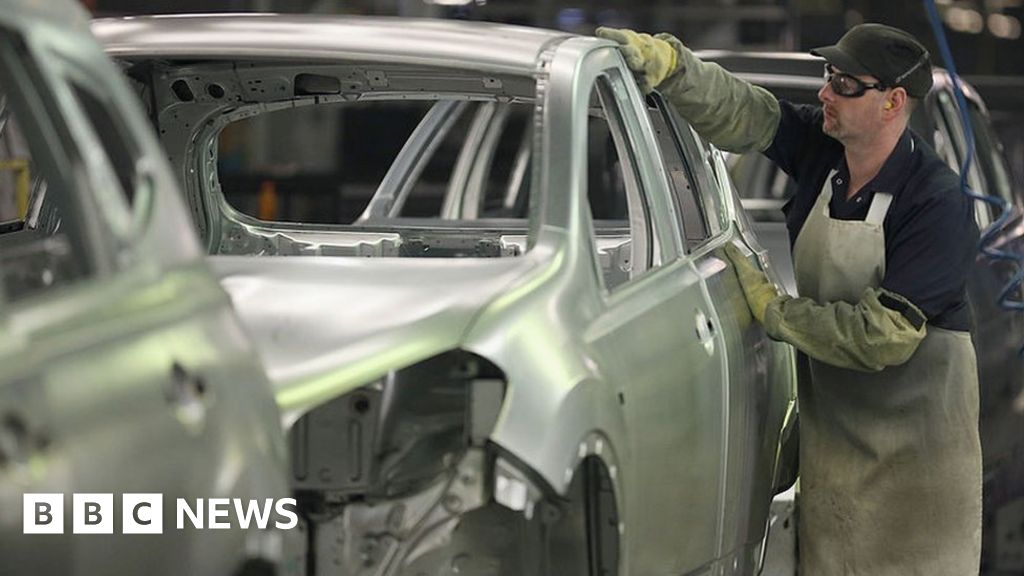Nissan Warns Costs Must Fall To Make New Electric Cars In UK

Nissan's Chief Operating Officer Ashwani Gupta
A senior boss at Nissan has warned the "economics have to work" for the company to make new electric models of its Juke and Qashqai cars in the UK.
Ashwani Gupta, chief operating officer at the firm, told the BBC the UK faced a challenge to remain competitive with other car-making countries.
He said manufacturing costs in the UK were higher than others due to higher energy bills and overall inflation.
Nissan employs more than 6,000 people at its Sunderland manufacturing plant.
Mr Gupta warned having lower production costs was key to keeping the UK competitive. He added other tools to keep the UK attractive to car-makers were ongoing government support in the transition to electric vehicles, as well as robust supply chains.
Nissan has already committed to producing the successor to its Leaf electric car at its factory in Sunderland, but Mr Gupta said that when it came to allocating production of new Juke and Qashqai models between its 44 global plants, the company "needed to have the economics to justify it".
The decision of where to build the new Juke and Qashqai does not have to be made for a couple of years yet as the next models of those big Sunderland-made sellers are not due until 2027-28, and decisions are usually made two or three years in advance.
Car makers often press governments to provide more support. Nissan recently secured about £100m in public money towards a £1bn investment in expanding a Chinese-owned battery plant located right next to its Sunderland plant.
But the map of global car manufacturing is being reshaped and the US is offering tens of billions in subsidies to car makers who move production and supply chains there. The EU is also expected to respond with carrots of its own.
The comments from Mr Gupta come as Nissan and Renault unveiled the details of a major shake-up of their often strained 24-year-old alliance, after months of negotiations between the motor industry giants.
In a joint statement, the two firms said they had "rebalanced" their relationship by agreeing that Renault would cut its stake in Nissan.
Under the deal, Nissan will take a stake in Renault's flagship electric car unit Ampere.
The companies also said that they will work together on electronics and battery technology, as well as making savings from joint projects in Europe, India and Latin America.
The agreement will see Renault cutting its stake in Japan's Nissan from more than 43% to 15%, the same size as Nissan's stake in its French counterpart.
The companies also said that Nissan will take a stake of up to 15% in Renault's new electric vehicle venture, Ampere.
Image source, EPA-EFE/REX/Shutterstock
Christopher Richter from investment group CLSA said the changes were necessary to keep the two-decade partnership alive.
"It's a last ditch attempt to save an alliance where the two partners don't get along very well," he told the BBC.
"Hopefully, by equalising their status in the alliance, they can put some of the rancour behind them, and find a limited number of activities where they can cooperate and add value to each other," Mr Richter added.
The move comes at a time of huge change for the motor industry as it transitions to electric vehicles and adopts new technology.
"We all know that auto firms will be amalgamated into five or six globally, especially due to the big changes occurring in AI technology," Seijiro Takeshita from the University of Shizuoka in Japan told the BBC.
"In that context, Nissan and Renault need to find a good partner, and that's what they are, at least nominally. They cannot and do not have the luxury of going alone in this battle," he added.
The alliance was formed in 1999 when Renault rescued Nissan from the brink of bankruptcy.
In 2016, they were joined by Mitsubishi, after Nissan took a major stake in the struggling Japanese firm.
The alliance was rocked in November 2018 when Nissan boss Carlos Ghosn was arrested over allegations that he had understated his annual salary and misused company funds. Mr Ghosn denied the charges.
At the time, Mr Ghosn was the chairman of the Japanese carmaker. He was also chairman of France's Renault and the boss of a three-way alliance between both carmakers and Mitsubishi.
You may also be interested in:
Carlos Ghosn talks to BBC business editor Simon Jack
From Chip War To Cloud War: The Next Frontier In Global Tech Competition
The global chip war, characterized by intense competition among nations and corporations for supremacy in semiconductor ... Read more
The High Stakes Of Tech Regulation: Security Risks And Market Dynamics
The influence of tech giants in the global economy continues to grow, raising crucial questions about how to balance sec... Read more
The Tyranny Of Instagram Interiors: Why It's Time To Break Free From Algorithm-Driven Aesthetics
Instagram has become a dominant force in shaping interior design trends, offering a seemingly endless stream of inspirat... Read more
The Data Crunch In AI: Strategies For Sustainability
Exploring solutions to the imminent exhaustion of internet data for AI training.As the artificial intelligence (AI) indu... Read more
Google Abandons Four-Year Effort To Remove Cookies From Chrome Browser
After four years of dedicated effort, Google has decided to abandon its plan to remove third-party cookies from its Chro... Read more
LinkedIn Embraces AI And Gamification To Drive User Engagement And Revenue
In an effort to tackle slowing revenue growth and enhance user engagement, LinkedIn is turning to artificial intelligenc... Read more

